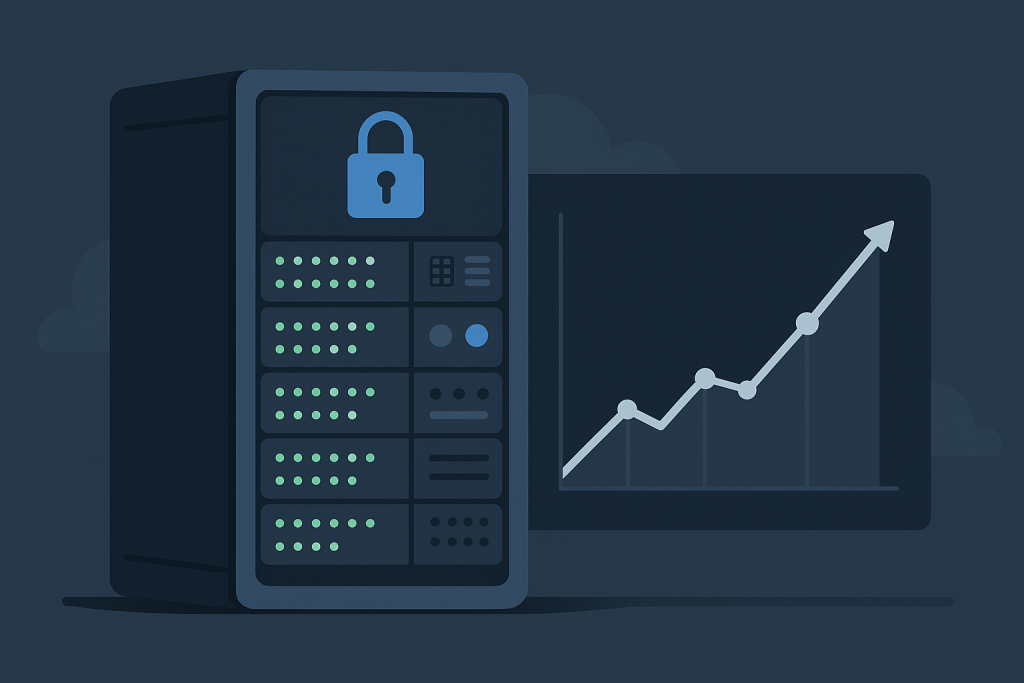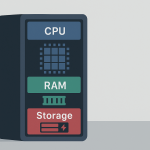In the vast and often confusing world of web hosting, choosing the right solution can feel like navigating a complex maze. You’ve likely encountered terms like shared hosting, VPS (Virtual Private Server), cloud hosting, and dedicated hosting. While shared hosting is a popular starting point for many small websites due to its affordability, and VPS and cloud offer excellent scalability, there comes a point for many growing businesses and ambitious projects where these options simply don’t cut it. This is where dedicated hosting steps onto the stage, offering a level of performance, control, and security that is unmatched by its counterparts.
But how do you know if you’ve reached that tipping point? When does the significant investment in a dedicated server truly pay off? This comprehensive guide will deep dive into the specific scenarios, growth indicators, and enterprise-level demands that make dedicated hosting not just a good choice, but an essential one. We’ll explore the critical role of traffic volume, the undeniable need for ultimate control, and the compelling enterprise use cases that solidify dedicated hosting as the powerhouse solution for serious online endeavors.
Understanding the Landscape: A Quick Hosting Recap
Before we fully immerse ourselves in the world of dedicated servers, let’s quickly contextualize where it sits among the other popular hosting types:
- Shared Hosting: Imagine living in a large apartment building. You have your own unit, but you share the common resources (like electricity, water, and sometimes even the internet connection) with all your neighbors. In web hosting terms, many websites reside on a single server, sharing its CPU, RAM, and disk space. It’s cheap, cheerful, and perfect for small blogs or personal sites with low traffic. However, a “noisy neighbor” (a website consuming too many resources) can impact your site’s performance.
- VPS Hosting: Think of a shared apartment building where each apartment is now a fully self-contained condo. You still share the building’s physical resources, but your slice is isolated and guaranteed. A VPS partitions a physical server into several virtual servers, each operating independently with its own OS, dedicated resources (CPU, RAM), and root access. It’s more powerful, secure, and flexible than shared hosting, offering a good middle ground for growing websites.
- Cloud Hosting: This is like having your house built on a dynamically scalable grid of resources. Instead of relying on a single physical server, your website’s resources are pulled from a vast network of interconnected servers. This offers incredible flexibility, scalability (you only pay for what you use, and resources can be added or removed on demand), and high availability. It’s excellent for unpredictable traffic spikes and agile development.
- Dedicated Hosting: This is the equivalent of owning a standalone mansion. You get an entire physical server, all to yourself. Every single resource – CPU, RAM, storage, and bandwidth – is yours and yours alone. This unparalleled isolation provides maximum performance, security, and control.
The Tipping Point: When Traffic Demands More
One of the most common and compelling reasons to upgrade to dedicated hosting is simply growth. Your website isn’t just a side project anymore; it’s a thriving platform experiencing significant and consistent traffic.
1. High and Sustained Traffic Volume
If your website consistently receives tens of thousands, hundreds of thousands, or even millions of visitors per month, shared or even most VPS environments will start to buckle. Here’s why dedicated hosting becomes crucial:
- Eliminating “Noisy Neighbors”: On shared and sometimes even VPS platforms, another website’s sudden surge in traffic or inefficient coding can deplete server resources, leading to slow loading times or even downtime for your site. With dedicated hosting, you have no neighbors. All resources are exclusively for your website, ensuring consistent performance regardless of what other sites are doing on other servers.
- Faster Load Times: High traffic often correlates with increased requests to your server. A dedicated server, with its unshared CPU and RAM, can process these requests much faster, leading to quicker page load times. This is vital for user experience (UX) and plays a significant role in SEO rankings. Google favors faster sites, and users are notoriously impatient – a few extra seconds can mean lost visitors and conversions.
- Handling Spikes Gracefully: While cloud hosting excels at unpredictable spikes, dedicated hosting provides a robust baseline for consistently high traffic with predictable peaks. If your website experiences regular, large traffic surges (e.g., during sales events, product launches, or viral content), a dedicated server can be provisioned with ample resources to handle these events without degradation.
2. E-commerce and Transactional Websites
For online stores, performance directly equates to revenue. A slow website or one that crashes during peak shopping hours can lead to abandoned carts and significant financial losses.
- Peak Season Resilience: Black Friday, Cyber Monday, holiday sales – these are make-or-break periods for e-commerce. A dedicated server ensures your store remains lightning-fast and fully operational even under immense load, safeguarding your transactions and customer trust.
- Database Performance: E-commerce sites rely heavily on databases for product catalogs, customer information, order tracking, and more. Dedicated servers provide the necessary I/O (Input/Output) speeds and memory to handle complex database queries quickly, ensuring a smooth shopping experience from browsing to checkout.
- Payment Gateway Integration: Secure and fast integration with payment gateways is non-negotiable. Dedicated hosting provides a stable and secure environment, minimizing latency during critical payment processing steps.
The Power of Ultimate Control: Customization & Environment
Beyond traffic, the desire for granular control over your hosting environment is a major differentiator for dedicated hosting.
1. Full Root/Administrator Access
With dedicated hosting, you gain full root (Linux) or administrator (Windows) access to the server. This is a game-changer for several reasons:
- Operating System Choice: You’re not restricted to the OS chosen by your host. You can install your preferred Linux distribution (Ubuntu, CentOS, Debian, etc.) or Windows Server, tailoring the environment to your specific application requirements.
- Custom Software & Applications: Need to install a very specific version of a programming language (e.g., PHP, Python, Ruby), a unique database system, or a niche application that isn’t supported on shared or standard VPS plans? Dedicated hosting gives you the freedom to do so. This is invaluable for specialized web applications, custom CRM/ERP systems, or specific development environments.
- Server Configuration: Every aspect of the server configuration, from web server software (Apache, Nginx, LiteSpeed) and database settings (MySQL, PostgreSQL, MongoDB) to caching mechanisms and security protocols, is under your direct control. You can optimize it precisely for your unique workload.
2. Enhanced Security Measures
While shared hosts implement security, you’re always part of a larger ecosystem. With dedicated hosting, security becomes entirely your domain (or your managed hosting provider’s).
- Physical Isolation: Your server is physically separate from others, eliminating the risk of cross-contamination from other websites or applications on the same hardware.
- Custom Security Policies: You can implement stringent firewalls, intrusion detection systems (IDS), custom access controls, and security auditing tools precisely tailored to your specific vulnerabilities and compliance requirements.
- Compliance Requirements: For businesses dealing with sensitive data (e.g., PCI DSS for credit card processing, HIPAA for healthcare, GDPR for personal data), dedicated hosting provides the isolated and controllable environment necessary to meet strict regulatory compliance standards. You have direct control over data storage, access logs, and encryption.
3. Resource Allocation and Optimization
On a dedicated server, you dictate how resources are used.
- Guaranteed Resources: All CPU cores, all RAM, and all disk I/O are yours. There are no other processes competing for these vital resources, ensuring peak performance for your applications.
- Hardware Choice: Many dedicated hosting providers allow you to customize the server hardware – choosing specific processors, amounts of RAM, types of storage (HDD for bulk, SSD/NVMe for speed), and network configurations. This allows for hyper-optimization for specific tasks. For example, a video streaming service would prioritize high storage and bandwidth, while a complex financial application might need maximum CPU and RAM.
- Environment Stability: Because you’re in full control and not sharing resources, the server environment is inherently more stable and predictable. This reduces unexpected performance dips or system crashes caused by external factors.
Enterprise Use Cases: Beyond Basic Websites
Dedicated hosting shines brightest in environments where reliability, performance, and specific technical requirements are paramount.
1. Large-Scale Web Applications
Complex web applications, SaaS platforms, and enterprise-level content management systems (CMS) often demand dedicated resources.
- Mission-Critical Applications: For applications where even minutes of downtime can translate to significant financial losses or operational disruption, dedicated hosting provides the highest uptime guarantees and performance consistency.
- Resource-Intensive Workloads: Applications involving real-time data processing, complex calculations, large databases, or extensive API integrations will benefit immensely from the raw power of a dedicated server.
- Custom Development Stacks: Many enterprise applications are built on unique technology stacks that require specific server environments and software configurations, which are easily accommodated on a dedicated server.
2. Gaming Servers
Online gaming platforms and even individual game servers require immense processing power, low latency, and stable network connections.
- High Performance for Multiplayer: Dedicated servers ensure smooth, lag-free gameplay for multiple concurrent players, which is crucial for competitive online gaming.
- Modding and Customization: Game server administrators often need full control to install custom mods, plugins, and configurations, which is only possible with root access on a dedicated machine.
- Reliable Uptime: Gamers demand servers that are always available. Dedicated hosting provides the stability needed to keep game worlds online 24/7.
3. Big Data and Analytics
Processing and storing vast amounts of data requires significant computational resources and fast I/O.
- Data Warehousing: Companies collecting and analyzing large datasets for business intelligence need robust storage solutions and powerful CPUs for data processing.
- Machine Learning/AI: Training complex machine learning models often requires dedicated GPU resources, which can be provisioned on specialized dedicated servers.
- Real-time Analytics: For applications that need to process and analyze data in real-time, the low latency and high throughput of dedicated hardware are indispensable.
4. Virtualization and Containerization
While a VPS is a virtual server, a dedicated server can host multiple virtual machines or containers (like Docker or Kubernetes).
- Private Cloud Environment: Enterprises can set up their own private cloud infrastructure on a dedicated server, running multiple virtual machines for different departments, projects, or client applications.
- Development and Staging Environments: A dedicated server can host multiple isolated environments for development, testing, staging, and production, ensuring consistency and preventing conflicts.
- Resource Isolation for Microservices: For applications built with microservices, a dedicated server can efficiently host multiple containers, each running a specific service, providing excellent performance and isolation.
5. Media Streaming & Content Delivery
Delivering high-quality video, audio, or large files to a global audience demands robust infrastructure.
- High Bandwidth: Streaming services require massive amounts of bandwidth. Dedicated servers can be provisioned with high-capacity network connections, often unmetered or with very generous allowances.
- Fast Content Delivery: Storing media files on high-speed SSDs or NVMe drives on a dedicated server ensures quick access and delivery to users, minimizing buffering.
- Scalable Architecture: While dedicated hosting provides the core power, it can also be integrated with Content Delivery Networks (CDNs) to further optimize global content distribution, with the dedicated server acting as the origin server.
Managed vs. Unmanaged Dedicated Hosting
Once you decide dedicated hosting is for you, another crucial choice emerges: managed or unmanaged.
- Unmanaged Dedicated Hosting: This is for the truly tech-savvy. You get the raw server, and you’re responsible for everything: OS installation, security patches, software updates, backups, monitoring, troubleshooting – literally everything. It offers maximum control and potentially lower costs but demands significant technical expertise and time. This is ideal for IT departments with dedicated system administrators.
- Managed Dedicated Hosting: Here, your hosting provider handles a significant portion (or even all) of the server administration tasks. This can include OS updates, security monitoring, server optimization, backups, and proactive maintenance. While more expensive, it frees up your team to focus on your core business and ensures your server is expertly maintained. This is often the preferred choice for businesses that need dedicated performance but don’t have an in-house team of server experts.
The Cost Factor: A Worthwhile Investment?
Let’s be upfront: dedicated hosting is more expensive than shared hosting or even most VPS plans. Prices can range from hundreds to thousands of dollars per month, depending on hardware specifications, bandwidth, and whether it’s managed or unmanaged.
However, viewing it purely as an expense misses the point. For businesses and projects that fit the criteria discussed, dedicated hosting is an investment that yields significant returns:
- Improved User Experience: Faster loading times and reliable uptime lead to happier customers and higher engagement.
- Increased Conversions: For e-commerce, a robust platform directly translates to more sales and fewer abandoned carts.
- Enhanced SEO: Google rewards fast, reliable websites with better search rankings.
- Superior Security: Protecting sensitive data and maintaining compliance can prevent costly breaches and legal issues.
- Operational Efficiency: For internal applications, a dedicated server ensures employees have fast, reliable access to critical tools.
- Brand Reputation: A high-performing website reflects positively on your brand and builds trust.
When you factor in potential lost revenue from downtime, slow performance, or security breaches on less robust hosting, the cost of dedicated hosting often pales in comparison to the potential losses.
Conclusion: Is Dedicated Hosting Your Next Step?
Dedicated hosting isn’t for everyone. If you’re just starting a blog or running a small personal website, it’s likely overkill. Shared hosting, or a well-configured VPS, will serve you perfectly fine.
However, if your website or application is experiencing consistent high traffic, requires specific software configurations, demands stringent security and compliance, or is mission-critical to your business operations, then dedicated hosting moves from a luxury to a necessity. It provides the unparalleled performance, unwavering reliability, and absolute control needed to support serious growth and complex enterprise-level demands.
By carefully evaluating your current traffic, your need for customization, your security requirements, and the nature of your applications, you can determine if the power and precision of a dedicated server are the logical and strategic next step for your online success. Don’t wait until your current hosting solution is crumbling under the pressure; proactively choose the infrastructure that will empower your future growth and solidify your digital presence.



